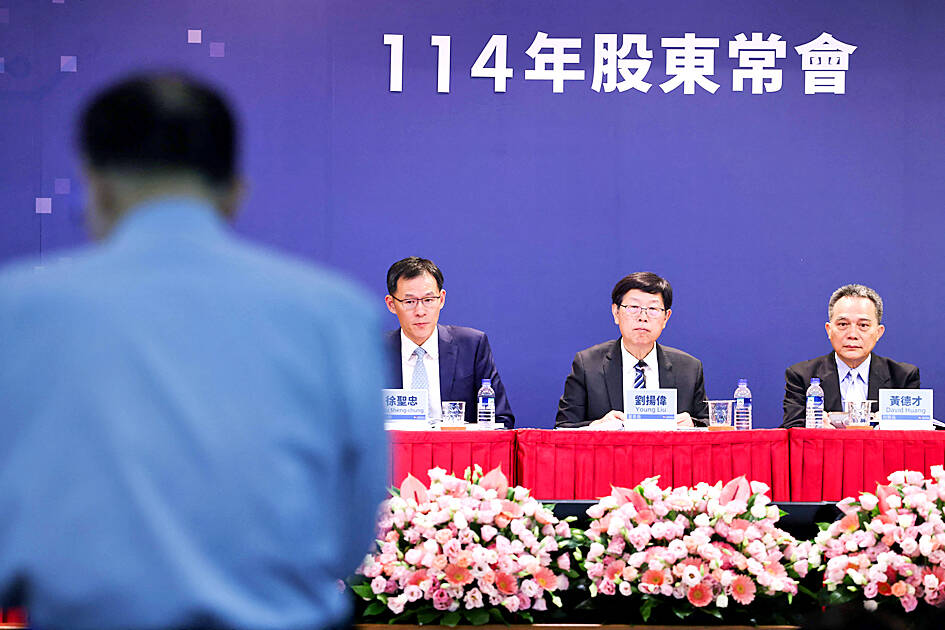Hon Hai Precision Industry Co (鴻海精密), the world’s biggest server maker, on Thursday said that revenue this year would expand to more than NT$7 trillion (US$233.9 billion), driven by growing demand for artificial intelligence (AI) servers.
Despite uncertainties from US tariffs, exchange rates, global monetary policies and geopolitics, Hon Hai remains optimistic that it would report “significant growth” this year, attributable to robust AI server demand, Hon Hai chairman Young Liu (劉揚偉) said at the company’s annual shareholders’ meeting.
“That means [revenue] this year would exceed the NT$6.86 trillion [last year] and surpass NT$7 trillion,” Liu said.

Photo: Cheng I-hwa, AFP
Along with AI servers, stable demand for information and communications technology, and electric vehicles (EV) would also be growth drivers over the next three years, Liu said.
In response to a shareholder’s question about Hon Hai’s progress in securing new EV orders, Liu said the company expects to add a second customer in the near future and might have a third and fourth after forming a partnership with Mitsubishi Motors Corp.
Hon Hai plans to launch its new EV Model C series for the US market in the fourth quarter of this year, and a Model D in 2027, Liu said.
In response to a shareholder’s question about separating the roles of chairman and chief executive officer, Liu said the change would take place in the coming three years.
Hon Hai implemented a chief executive officer rotation system in April last year, with executives from various business units taking turns to assume the position.
These temporary chief executive officers are expected to become an official chief executive officer over time, he said.
The company last month announced that global chief campus operations officer Kathy Yang (楊秋瑾) would become the group’s next rotating chief executive officer, replacing Lin Chung-cheng (林忠正), president of Hon Hai’s e-business group.
Shareholders approved a cash dividend of NT$5.8 per share, the highest in the company’s history. That represents a payout ratio of 52.68 percent based on the company’s earnings per share of NT$11.01 last year.
Hon Hai also re-elected nine board members, including four candidates proposed as board members and five independent directors during the meeting.
Young was re-elected as chairman during a board meeting on Thursday.
Among the four board directors, Hon Hai semiconductor business strategist Chiang Shang-yi (蔣尚義) was tapped as a director for the first time. Chiang also doubles as chairman of ShunSin Technology Holdings Ltd (訊芯), a subsidiary of Hon Hai.

Sweeping policy changes under US Secretary of Health and Human Services Robert F. Kennedy Jr are having a chilling effect on vaccine makers as anti-vaccine rhetoric has turned into concrete changes in inoculation schedules and recommendations, investors and executives said. The administration of US President Donald Trump has in the past year upended vaccine recommendations, with the country last month ending its longstanding guidance that all children receive inoculations against flu, hepatitis A and other diseases. The unprecedented changes have led to diminished vaccine usage, hurt the investment case for some biotechs, and created a drag that would likely dent revenues and

Global semiconductor stocks advanced yesterday, as comments by Nvidia Corp chief executive officer Jensen Huang (黃仁勳) at Davos, Switzerland, helped reinforce investor enthusiasm for artificial intelligence (AI). Samsung Electronics Co gained as much as 5 percent to an all-time high, helping drive South Korea’s benchmark KOSPI above 5,000 for the first time. That came after the Philadelphia Semiconductor Index rose more than 3 percent to a fresh record on Wednesday, with a boost from Nvidia. The gains came amid broad risk-on trade after US President Donald Trump withdrew his threat of tariffs on some European nations over backing for Greenland. Huang further

CULPRITS: Factors that affected the slip included falling global crude oil prices, wait-and-see consumer attitudes due to US tariffs and a different Lunar New Year holiday schedule Taiwan’s retail sales ended a nine-year growth streak last year, slipping 0.2 percent from a year earlier as uncertainty over US tariff policies affected demand for durable goods, data released on Friday by the Ministry of Economic Affairs showed. Last year’s retail sales totaled NT$4.84 trillion (US$153.27 billion), down about NT$9.5 billion, or 0.2 percent, from 2024. Despite the decline, the figure was still the second-highest annual sales total on record. Ministry statistics department deputy head Chen Yu-fang (陳玉芳) said sales of cars, motorcycles and related products, which accounted for 17.4 percent of total retail rales last year, fell NT$68.1 billion, or

HSBC Bank Taiwan Ltd (匯豐台灣商銀) and the Taiwan High Prosecutors Office recently signed a memorandum of understanding (MOU) to enhance cooperation on the suspicious transaction analysis mechanism. This landmark agreement makes HSBC the first foreign bank in Taiwan to establish such a partnership with the High Prosecutors Office, underscoring its commitment to active anti-fraud initiatives, financial inclusion, and the “Treating Customers Fairly” principle. Through this deep public-private collaboration, both parties aim to co-create a secure financial ecosystem via early warning detection and precise fraud prevention technologies. At the signing ceremony, HSBC Taiwan CEO and head of banking Adam Chen (陳志堅)